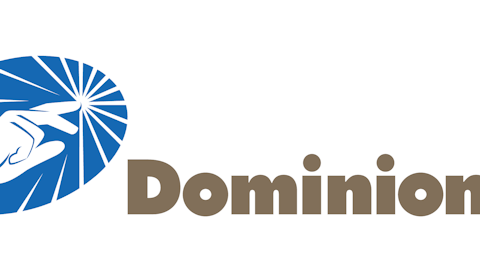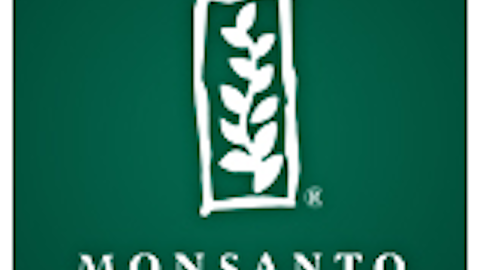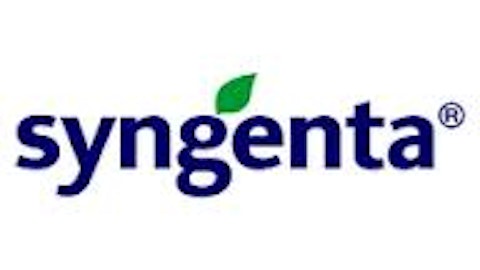Back in 1802, when President Jefferson was trudging around the White House, E I Du Pont De Nemours And Co (NYSE:DD) was born. It’s since moved from an initial concentration in gunpowder manufacturing into the vast world of chemicals, and now to its latest manifestation in agricultural and food-related products.
The most recent transmogrification has clearly gained momentum since Ellen Kuhlman assumed its CEO mantel five years ago. It’s hard to see that directional change doing anything but intensifying.

In that context, it’s probably not unrealistic to assume that, in another five years, the company will be devoting virtually all of its efforts creating the bio-engineered seeds, pesticides, and other products that will play key roles in feeding the 2 million additional folks who are expected to join us on Planet Earth in the next several decades. In fact, E I Du Pont De Nemours And Co (NYSE:DD) is already in a league with Monsanto Company (NYSE:MON), which had a head start in reinventing itself as a largely agriculture company, and now does little else.
For that very reason, it’s been especially edifying for me to peruse the transcript of a presentation by Jim Borel, a E I Du Pont De Nemours And Co (NYSE:DD) executive vice president, with responsibility for the company’s agricultural and nutrition businesses. At mid-week, Borel addressed analysts at the RBC Capital Markets Global Industrials Conference in Las Vegas.
The action never ceases
Before I pass along some of Borel’s specific comments about E I Du Pont De Nemours And Co (NYSE:DD)’s agriculture and nutrition segments, let’s review the bidding on some of the recent structural changes that have been completed, or are pending, at DuPont:
1). In 2011, E I Du Pont De Nemours And Co (NYSE:DD) paid $6.3 billion, including debt assumptions, for Danisco, a global enzyme and specialty food ingredients company based in Denmark.
2). Last year, DuPont sold its car paint unit to the Carlyle Group LP (NASDAQ:CG), a private equity firm, for $5 billion.
3). Also in 2012, DuPont acquired the remaining 28% it didn’t already own in Solae, a St. Louis-based developer of soy-based ingredients.
4). Last month, following an arduous three-year process, the company completed a transaction that gave it 80% of South Africa’s Pannar Seed. It thereby has gained an entree to effect much-needed agricultural improvements and efficiencies on that giant continent.
5). With its Performance Chemicals segment suffering major declines in both revenues and operating income during the most recent quarter, it’s a safe bet that the laggard operation will belong to someone else within the reasonably near term. A sale of the unit likely would fetch about $10 billion.
Real indications of progress
With those significant events as a backdrop, let’s now look at some of Borel’s key comments about DuPont’s progress in the agricultural and nutrition segments:
1). Between 2010 and 2012, the ag businesses outstripped its peers, growing at an annual 15% rate.
2). The Dansco acquisition has become accretive to the company far faster than was expected, having added about $0.25 to 2012 EPS.
3). In crop protection, the company is already nearing $900 million in revenues from “our blockbuster insect control products called Rynaxypyr.” (There will be a spelling test.) Beyond that, it has recently added two other unpronounceable, but effective, disease-control products to its repertoire.
4). Borel expects DuPont’s contribution to the $40-billion nutrition and health-care market to maintain at least 6% annual growth over time.
5). The company is working toward the rollout of DP 4114, a lethal enemy of above- and below-ground pests, along with Optimum GLY canola, a weed eradication agent.
6). Also nearing its introduction is the company’s Plenish high oleic soybean. The product is devoid of trans fats, a boon to food companies that now must label the volume of the trans fats in their products.
Bottom line
For the past several years, I’ve been keeping an eye on agriculture-related companies, given the almost-certain global expansion of their markets. Monsanto Company (NYSE:MON) is, of course, a leader in the group, and Canada’s Agrium Inc. (USA) (NYSE:AGU), which plies its trade largely in crop protection products and soil nutrients, is well worth monitoring.
However, as an avowed management freak, I continue to find the decisiveness and steady progress at DuPont tough to top.
The article DuPont: New Life for an Ancient Company originally appeared on Fool.com and is written by David Smith.
Fool contributor David Smith has no position in any stocks mentioned. The Motley Fool has no position in any of the stocks mentioned.
Copyright © 1995 – 2013 The Motley Fool, LLC. All rights reserved. The Motley Fool has a disclosure policy.




